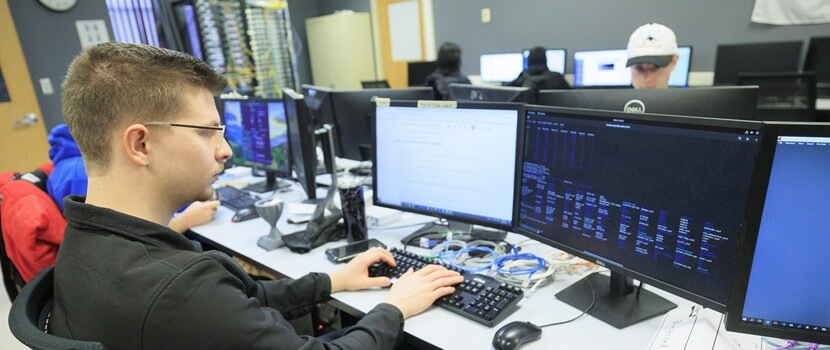
Delivery of this program in Regina is suspended until further notice.
The Cyber Security post-graduate certificate prepares students for the challenges of identifying network and computer system vulnerabilities, conducting ethical hacks to determine system risk and designing organizational cyber security plans.
Start date
September - Saskatoon
January - Regina and Saskatoon
Length
41 weeks (January - October) or (September - June)
Location(s)
Regina, SaskatoonThe program content is based on the expectation that students will have developed problem-solving skills and basic research skills in their undergraduate information and communication technology degrees, and that the Cyber Security post-graduate certificate program will enhance their existing knowledge and skills. Cyber security is everyone's business, and developing current practical knowledge is important in this digital growth industry.
Career and salary information
Your career
Through your studies, you will develop knowledge and skills in:
- cyber security operations
- penetration testing
- information security investigation and forensics
- web security
- security consultation
- security analysis
- security administration
Admissions
Admission requirements
- A conferred bachelor's degree in any discipline, with a minimum GPA of 60%
- English Language Requirement
Note:
Applicants should have previous networking training. Applicants might need a Criminal Record Check and be bondable to meet future employer requirements.
Admission method
First Qualified/First Admitted
The First Qualified/First Admitted (FQFA) process is used for the majority of Saskatchewan Polytechnic programs. When we determine that you meet the program's admission requirements, you will be offered admission based on the date you fully qualify for the program. The earlier you provide the appropriate documents and information that qualify you for admission to the next intake, the earlier you might begin your studies.
Applications for all FQFA programs open September 1 each year.
Sponsored programs or programs targeted to specific groups do not accept applications year round or maintain an application pool.
See Admission Processes for more information about this method of admission.
Tuition and fees
2025-26 academic year
$16,250
This program is bring your own device. Students are required to bring their own laptop to class daily. The minimum requirements for this device are:
- Intel I5
- 16GB memory
- 256GB HD
- Windows (not MAC)
International students
View tuition rates for international students.
Courses
Get credit for what you know
Prior Learning Assessment and Recognition
Saskatchewan Polytechnic recognizes that adults learn in many different ways. This includes acquiring knowledge and skills through life and work experience or non-formal training.
See link(s) below to get more information about PLAR.
Transfer credit
Many Sask Polytech students benefit from transferring course credit. You may be eligible to transfer credit to Sask Polytech or to another college or university.
Student awards
Thanks to the generosity of donors and alumni, Saskatchewan Polytechnic gives away more than $2 million in student awards during the academic year.
Saskatchewan Polytechnic offers student awards for every certificate and diploma program at every campus. Not all student awards are based on marks - some are based on financial need or things like community or volunteer involvement.

